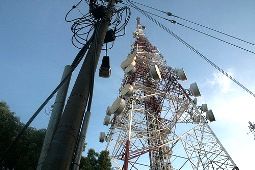 The cumulative debt of telecom companies has risen a little over 200 per cent to an estimated Rs 2.5 lakh crore (Rs 2.5 trillion) in 2012-13 from Rs 82,726 crore (Rs 827.26 billion) in 2008-09.
The cumulative debt of telecom companies has risen a little over 200 per cent to an estimated Rs 2.5 lakh crore (Rs 2.5 trillion) in 2012-13 from Rs 82,726 crore (Rs 827.26 billion) in 2008-09.
Also, their cumulative external debt had increased to 49 per cent of total debt in 2011-12 from 34 per cent in 2009-10, according to the Cellular Operators Association of India.
Sector analysts say this might have risen further during 2012-13 to about 55 per cent.
While all the operators have foreign currency loan exposure, Bharti Airtel leads with about 81 per cent (Rs 59,000 crore or Rs 590 billion) of its total debt in forex.
According to Capitaline data, Airtel’s interest outgo is Rs 4,384 crore (Rs 43.84 billion) annually.
Reliance Communications (RCom), which had debt of Rs 37,478 crore (Rs 374.78 billion) till March 31, 2013, had about Rs 27,000 crore (Rs 270 billion) or about 69 per cent, in foreign currency.
About 60 per cent of Idea Cellular’s total debt of Rs 12,263 crore (Rs 122.63 billion) is in foreign currency.
According to a telecom analyst with a management consulting firm, about 80 per cent of the total external debt of telecom companies is dollar-linked.
With the rupee depreciating more than 10 per cent since the start of May, telcos are likely to take a hit.
“Increase in interest payment for foreign currency loans would largely depend on the payment terms.
"If a loan has annual payment mode, there might not be much impact as the rupee value might increase by the time the company needs to pay the annual interest,” said the analyst.
Bharti Airtel’s exposure to the rupee’s depreciation is mainly led by the unhedged $8.7-billion loan the company had taken for its African acquisition.
According to a recent report by Goldman Sachs, a further five per cent decline in the rupee’s value could lower Bharti Airtel’s FY15 estimated earnings per share by 4.1-3.5 per cent.
“Our global debt of around $10 billion is in various currencies and across 20 countries.
"The dollar-rupee movement impacts only the dollar-dominated debt taken in India (about $500 million).
"Our international assets, in Africa for example, are dollar-dominated, with functional currency according to accounting standards being the dollar.
"Accordingly, for any dollar-dominated loan for these, there is no currency fluctuation impact due to the dollar’s appreciation or vice versa,”
For RCom, analysts said the company might actually be benefited by the rupee depreciation, as subsidiary Globalcom’s revenue is dollar-denominated.
“There would be a negative impact on interest and principal payments.
"We estimate the overall impact on the next two years’ EPS will be around 7.3 per cent and 4.6 per cent, respectively, if the rupee depreciates by another five per cent,” said the Goldman report.
The sector’s overall debt will rise further over the next few years.
Over the next one to two years, telcos will need more money to pay the one-time fee of about Rs 31,000 crore or Rs 310 billion (government estimates) for holding additional spectrum beyond 4.4 MHz (2.5 MHz for CDMA operators).
They’d also need to invest about Rs 1.5 lakh crore (Rs 1.5 trillion) if the government goes ahead with refarming of the 900 MHz spectrum.
Also, some telos will need to be prepared for the auction of 700 MHz spectrum, which the government plans to conduct next year, for better 4G or long-term evolution services.
“Telecom companies are already burdened with huge debt and this would increase further, as all telcos need to invest more in infrastructure.
"Also, if the government goes ahead with refarming, it would cost the incumbent operators about Rs 1.25 lakh crore (Rs 1.25 trillion) in incremental capex and Rs 0.25 crore (Rs 2.5 million) in equipment write-off,” said COAI director general Rajan Mathews.
However, Morgan Stanley, in a recent report, has estimated Bharti’s net debt would come down to Rs 40,480 crore by FY15.
Idea Cellular’s net debt is also estimated to be lower at Rs 9,917 crore (Rs 99.17 billion) and RCom’s net debt is likely to come down to Rs 32,840 crore (Rs 328.4 billion) by FY15, the report said.
Airtel’s cost of debt is lower that its listed competitors at 11 per cent (reducing), while it is 12 per cent for Idea Cellular and 12.73 per cent for RCom, said the Morgan Stanley study.
After-tax cost of debt (reducing) is 8.5 per cent for Airtel, followed by 9.3 per cent for Idea Cellular and 9.9 per cent for RCom.
COAI recently sought intervention of the department of telecommunications to improve the financial conditions of telcos.
“High debt coupled with policy uncertainty is keeping foreign direct investment away.
"Hunder per cent FDI should be permitted to bring in large investments into the sector,” COAI has said to DoT.












 © 2025
© 2025